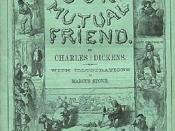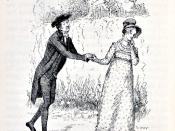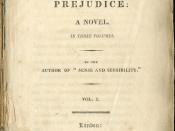In two societies where social hierarchy rules over love in marriage, the tones of selfish progression in teh passage from Pride and Prejudice counter those of loving sercurity in the passage from Our Mutual Friend. The character of Mr. Collins uses marriage fro social gain, having it take precedence over the feelings of the woman to whom he wants to marry. The other man longs to probide for the woman he loves and wishes to marry.
The author's diction in the first passage conveys Mr. Collins lack of natural fire or passion towards teh woman he wishes to wed. Under teh "recommendation" of his "patroness" he decided to choose a "gentlewoman" to make his wife. He is only marrying to please his boss in hopes of furthering his own social standing. By choosing a woman of humble origin his partoness wil allow his wife the honor of a visit from her personally.
Contrary to the first passage the second conveys a man's passionate love for a woman. Under the influence of "tremendous" attraction and a love that "overmasters" the man desperately seeks for a "favorable" answer to his offer of marriage. This man has tried to resist his love but it and the attraction are just too strong for him to overcome. His only solution to his mad is for her to accept his hand in marriage. While Mr. Collins drive is for self happiness the other man's drive is for the happiness of the woman whom he loves.
The detail in the "Pride and Prejudice" passage illuminates Mr. Collin's lack luster and formality in his proposal while the passage from Our Mutual Friend protrays the man's eagerness and passion of his love. Mr. Collins blatantly states "his reasons for marrying" concluding that the rank of his patroness "is...


